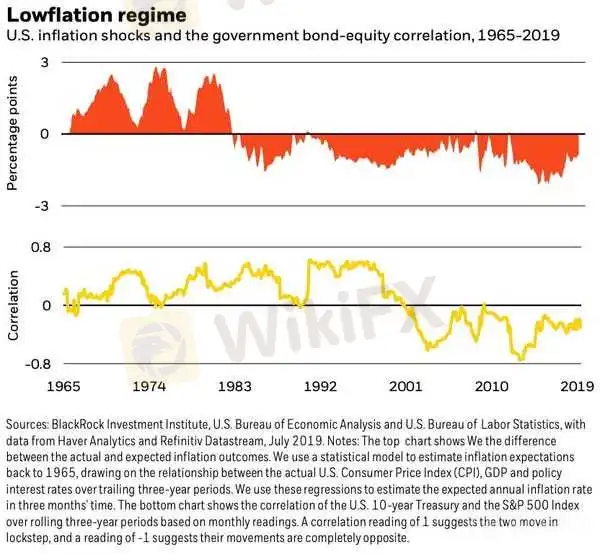简体中文
繁體中文
English
Pусский
日本語
ภาษาไทย
Tiếng Việt
Bahasa Indonesia
Español
हिन्दी
Filippiiniläinen
Français
Deutsch
Português
Türkçe
한국어
العربية
Next market crash: BlackRock warns of inflation risk portfolio impact - Business Insider
Abstract:A senior leader at BlackRock has described this risk as more ominous than the threat of a recession — yet the stock market is not paying attention.
The biggest risk to investors right now is an unexpected jump in inflation, but it's still being overlooked, according to multiple leaders at BlackRock. The $6.8 trillion investment firm recently flagged the potential damage this event could do to portfolios, and shared its recommendation for how to hedge the risk.Click here for more BI Prime stories. Various Wall Street firms have flagged similar risks that stock-market investors should have on their radars right now. These include a profit slowdown, the US elections, lack of progress on trade, and a corporate-credit crisis. But one risk that is not being talked about nearly enough is inflation, according to BlackRock, the world's largest money manager with $6.8 trillion in assets.This apparent oversight can be explained by the fact that inflation — defined as a sustained increase in prices across the board — has lived below expectations for a long time. The Federal Reserve's favorite gauge of inflation has averaged 1.5% over the past decade according to Bloomberg data, missing its 2% target.Additionally, a separate measure compiled by BlackRock shows there has yet to be an inflation surprise comparable to the oil-price shock of the 1970s. It is represented in the red area chart below.

BlackRock
Even BlackRock does not consider an inflation shock next year as a likely event. However, multiple leaders worry about the damage such a surprise could do to their clients' portfolios, they are flagging the danger before it's too late.Inflation is “the hidden risk longer-term” given how few investment professionals have experienced it, said Tony DeSpirito, BlackRock's chief investment officer for fundamental US active equities, at a recent media briefing. Marilyn Watson, the head of global fundamental fixed income strategy team, was in agreement along with Mike Pyle, the global chief investment strategist. All three of them had the same response to a question about the most underappreciated risk in the market right now. A 'high-impact event'Pyle elaborated that their concern is about how inflation would impact diversified portfolios of stocks and bonds.When stock prices fall in a fear-filled climate, bond prices typically rise as investors flock to a safer asset. In other words, bonds and stocks normally have a negative correlation with each other. But if inflation rises above prevailing bond yields, bonds would lose their appeal to investors as a safe haven. This could upend the negative correlation and alter the diversification benefit of bonds, Pyle said. “That is a really high-impact event — even if it's really low in probability risk — and one that's very unappreciated by market prices,” Pyle said. Higher inflation could stem from a rebound in economic growth — a prospect that would not be far-fetched if more progress is made on the US-China trade front.On Friday, the US announced it agreed to lower the tariff rate on China to 7.5% from 15% and cancel plans to target virtually all imports from that country. Following this news, the bond market's inflation expectation over the next decade — US 10-year breakevens — rose to 1.75%, the highest since July according to Bloomberg data. The big picture still has not changed. So what's an investor to do in order to protect themselves from a real surprise? BlackRock recommends buying Treasury Inflation-Protected Securities, a category of US government bonds that work as advertised because their yields are indexed to inflation. And if you would rather not buy TIPS directly, BlackRock has an exchange-traded fund for you: the iShares TIPS Bond ETF.
Disclaimer:
The views in this article only represent the author's personal views, and do not constitute investment advice on this platform. This platform does not guarantee the accuracy, completeness and timeliness of the information in the article, and will not be liable for any loss caused by the use of or reliance on the information in the article.
Read more

Why Is UK Inflation Rising Again Despite Recent Lows?
October inflation rises to 2.3%, driven by energy costs. Renters face 8% annual hikes, while house price inflation climbs. Interest rates stay elevated.

How Inflation Rates Affect Forex Prices Globally
In this article, we’ll explore how inflation affects forex prices globally, the relationship between inflation and currency value, and why traders monitor inflation closely.

PH Financial Sector Grows to P32.3T, Up 10.5% in June
The Philippine financial sector expanded by 10.5% in June, reaching P32.3 trillion. Bank resources surged, while positive earnings drove stock market gains.

US Inflation Cools, But Economic Pressures Still Remain
Inflation shows signs of cooling in the U.S., but persistent economic pressures, particularly housing and utilities, continue to challenge growth.
WikiFX Broker
Latest News
Hackers Charged for $11M Crypto Theft Using SIM-Swaps
Role of Central Banks in the FX Market
FCA Alerts Against Sydney FX
What Makes Cross-Border Payments Easier Than Ever?
Trader Exposes Unethical Practices by STP Trading
Malaysian Man Loses RM113,000 in Foreign Currency Investment Scam
Bitcoin Nears $100,000: A Triumph of Optimism or a Warning Sign?
Mastercard Partners with JPMorgan for B2B Cross-Border Payments
FCA Identifies Clone Firm Exploiting Admiral Markets' Credibility
Coinbase Under Scrutiny Amid Wrapped Bitcoin Delisting Controversy
Currency Calculator


